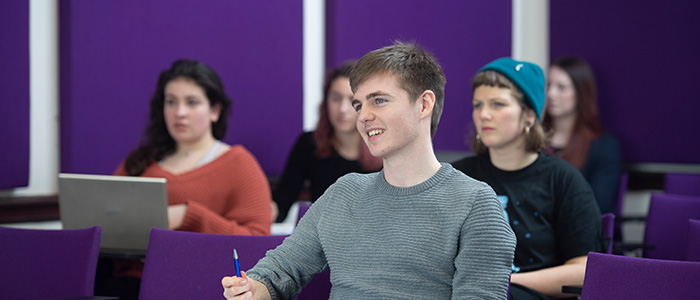Scottish Literature PhD/MLitt (Research)/MPhil (Research)/MRes
The University of Glasgow hosts the only academic unit in the UK exclusively dedicated to the teaching and research of Scottish Literature.
- PhD: 3 years full-time; 5 years part-time; Thesis of 70,000-100,000 words
- MLitt (Research): 2 years full-time; 3 years part-time; Thesis of 40,000-70,000 words
- MPhil (Research): 1 year full-time; 2 years part-time; Thesis of 30,000-40,000 words
- MRes: 1 year full-time; 2 years part-time; Thesis of 20,000-30,000 words
Overview
Scottish literature fulfils a unique role at the University of Glasgow where it has been a fully-fledged independent subject since the early 1970s. As a relatively ‘new’ subject in the academic context there is a great deal of research work still to be undertaken in Scottish literary studies. Glasgow is supremely well placed to support exciting postgraduate and postdoctoral research.
Scottish literature at Glasgow is well connected to a number of key archives of Scottish material held by our own Special Collections and the Mitchell Library in the city. Moreover we have strong connections with Edinburgh’s National Library of Scotland and the Scottish Poetry Library, both of which house a wealth of materials relating to Scottish writers and literature of all periods.
Our students have had much success in the last ten years with funding from the Arts and Humanities Research Council, and the Carnegie Trust for the Universities of Scotland. And we offer smaller student bursaries for specifically Scottish projects.
Topics in which we would welcome postgraduate research include:
- Scottish literature of the 16th and 17th century Renaissance’
- 18th-century literary tradition
- Robert Burns studies
- Scottish Romanticism
- 20th-century Scottish modernism
- contemporary Scottish literature.
Research groups
Contact: Professor Alan Riach, PG Convener, Scottish Literature
Study options
PhD
- Duration: 3 years full-time; 5 years part-time
- Thesis length: 70,000-100,000 words, including references, bibliography and appendices (other than documentary appendices).
A Doctor of Philosophy may be awarded to a student whose thesis is an original work making a significant contribution to knowledge in, or understanding of, a field of study and normally containing material worthy of publication.
MLitt (Research)
- Duration: 2 years full-time; 3 years part-time
- Thesis length: 40,000-70,000 words (including references, bibliography and appendices).
Our Degree of Master of Letters (Research) requires you to undertake a postgraduate course of special study and research that represents a distinct contribution to knowledge.
MPhil (Research)
- Duration: 1 year full-time; 2 years part-time
- Thesis length: 30,000-40,000 words (including references and bibliography).
A Master of Philosophy (Research) requires you to undertake a postgraduate course of special study and research that represents a distinct contribution to knowledge.
MRes
- Duration: 1 year full-time; 2 years part-time
- Thesis length: 20,000-30,000 words (including references, bibliography and appendices).
Our Master of Research includes both taught and research elements. You will be required to undertake 60 to 80 credits worth of taught courses as well as independent study which represents some contribution to knowledge.
Distance Learning
It may be possible to undertake a postgraduate research degree (with the exception of MRes) in the College of Arts and Humanities by distance learning. If you wish to explore this option, you should discuss it initially with your proposed supervisor.
Entry requirements
Our regular standard of admission is at least an Upper Second Class Honours degree (2:1), although candidates will usually also have completed or be undertaking a Masters qualification.
Research outline
Candidates are required to provide an outline of the proposed research subject in about 1000 words. This need not be your final thesis proposal but should include:
- a straightforward, descriptive, and informative title
- the question that your research will address
- an account of why this question is important and worth investigating
- an assessment of how your own research will engage with recent study in the subject
- a brief account of the methodology and approach you will take
- a discussion of the primary sources that your research will draw upon, including printed books, manuscripts, archives, libraries, or museums
- an indicative bibliography of secondary sources that you have already consulted and/or are planning to consult
Your application, including your references and research proposal, will be passed to members of staff whose expertise and research interests most closely match the area of your proposed study.
English language requirements
For applicants whose first language is not English, the University sets a minimum English Language proficiency level.
International English Language Testing System (IELTS) Academic module (not General Training)
- International English Language Testing System (IELTS) Academic module (not General Training)
7.0 with no subtests under 7.0 - Tests must have been taken within 2 years 5 months of start date. Applicants must meet the overall and subtest requirements using a single test.
Common equivalent English language qualifications
TOEFL (ibt, my best or athome)
- 94; with Reading 24; Listening 24; Speaking 23; Writing 27
- Tests must have been taken within 2 years 5 months of start date. Applicants must meet the overall and subtest requirements , this includes TOEFL mybest.
Pearsons PTE Academic
- 66 with no subtest less than: Listening 66;Reading 68; Speaking 65; Writing 82
- Tests must have been taken within 2 years 5 months of start date. Applicants must meet the overall and subtest requirements using a single test.
Cambridge Proficiency in English (CPE) and Cambridge Advanced English (CAE)
- 185 overall, no subtest less than 185
- Tests must have been taken within 2 years 5 months of start date. Applicants must meet the overall and subtest requirements using a single test.
Oxford English Test
- Oxford ELLT 8
- R&L: OIDI level no less than 8 with Reading: 27-28 and Listening: 20
- W&S: OIDI level no less than 8
Trinity College Tests
Integrated Skills in English II & III & IV: ISEII Pass with Pass in all sub-tests.
University of Glasgow Pre-sessional courses
Tests are accepted for 2 years following date of successful completion.
Alternatives to English Language qualification
- Degree from majority-English speaking country (as defined by the UKVI including Canada if taught in English)
- students must have studied for a minimum of 2 years at Undergraduate level, or 9 months at Master's level, and must have complete their degree in that majority-English speaking country and within the last 6 years
- Undergraduate 2+2 degree from majority-English speaking country (as defined by the UKVI including Canada if taught in English)
- students must have completed their final two years study in that majority-English speaking country and within the last 6 years
For international students, the Home Office has confirmed that the University can choose to use these tests to make its own assessment of English language ability for visa applications to degree level programmes. The University is also able to accept UKVI approved Secure English Language Tests (SELT) but we do not require a specific UKVI SELT for degree level programmes. We therefore still accept any of the English tests listed for admission to this programme.
Fees and funding
Fees
2024/25
- UK: £4,786
- International & EU: £25,290
Prices are based on the annual fee for full-time study. Fees for part-time study are half the full-time fee.
Irish nationals who are living in the Common Travel Area of the UK, EU nationals with settled or pre-settled status, and Internationals with Indefinite Leave to remain status can also qualify for home fee status.
Alumni discount
We offer a 20% discount to our alumni on all Postgraduate Research and full Postgraduate Taught Masters programmes. This includes University of Glasgow graduates and those who have completed Junior Year Abroad, Exchange programme or International Summer School with us. The discount is applied at registration for students who are not in receipt of another discount or scholarship funded by the University. No additional application is required.
Possible additional fees
- Re-submission by a research student £540
- Submission for a higher degree by published work £1,355
- Submission of thesis after deadline lapsed £350
- Submission by staff in receipt of staff scholarship £790
Depending on the nature of the research project, some students will be expected to pay a bench fee (also known as research support costs) to cover additional costs. The exact amount will be provided in the offer letter.
- College of Arts & Humanities Graduate School funding opportunities
Support
Resources
Teaching and research in the Arts and Humanities is supported by the outstanding resources of our University Library with its special collections and our on-campus Hunterian Museum and Art Gallery.
Our close links and partnerships with Glasgow Life, and the city’s many museums, art galleries, performing arts and music venues, international festivals and creative industry organisations make the University of Glasgow the ideal place for postgraduate study of the arts.
Graduate School
Our Graduate School creates a productive and interdisciplinary collegiate environment for all of our research students. We offer a range of services, courses and skills development opportunities for research students.
The College of Arts & Humanities is home to a vibrant and diverse community of students enrolled on taught masters and research programmes within a stimulating intellectual and cultural environment. Across every school and subject area the college is home to world-leading and agenda-setting research.
Find out more about what is happening in the community by following us:
You will also be part of the wider Scottish Graduate School for Arts and Humanities, the world's first national graduate school in the Arts & Humanities. Membership includes 16 Scottish universities, four art schools & the national conservatoire, with support from the arts, culture, creative & heritage sectors.
How to apply
Identify potential supervisors
All Postgraduate Research Students are allocated a supervisor who will act as the main source of academic support and research mentoring. You may want to identify a potential supervisor and contact them to discuss your research proposal before you apply. Please note, even if you have spoken to an academic staff member about your proposal you still need to submit an online application form.
You can find relevant academic staff members with our staff research interests search.
Gather your documents
Before applying please make sure you gather the following supporting documentation:
- Final or current degree transcripts including grades (and an official translation, if needed): scanned copy in colour of the original document.
- Degree certificates (and an official translation, if needed): scanned copy in colour of the original document.
- Two references on headed paper and signed by the referee. One must be academic, the other can be academic or professional. References may be uploaded as part of the application form or you may enter your referees contact details on the application form. We will then email your referee and notify you when we receive the reference. We can also accept confidential references direct to rio-researchadmissions@glasgow.ac.uk, from the referee’s university or business email account.
- Research proposal, CV, samples of written work as per requirements for each subject area.
- For Distance Learning study option only - completed CoAH Distance Learning PGR application statement form
Contact us
- If you have any questions about your application before you apply: contact The School of Critical Studies (Critstudies-PGApplications@glasgow.ac.uk)
- If you have any questions after you have submitted your application: contact our Admissions team
- Any references may be submitted by email to: rio-researchadmissions@glasgow.ac.uk
International Students

Our research environment




